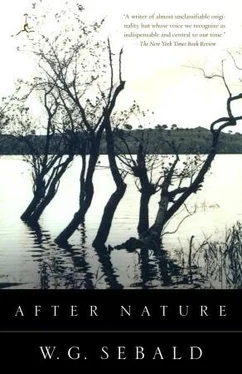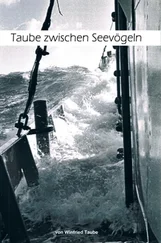of the steam engine as
the first warm-blooded animal
created by humankind.
At the break of the following day,
St. Elijah’s Day,
Steller went ashore. Ten hours
Bering, with dread already imprinted
on his brow, had granted him
for a scientific excursion.
Now a deep blueness
pervaded both water and the forests
that grew right down
to the coast. Unperturbed
animals came close to Steller, black
and red foxes, magpies too, jays and
crows went with him on his way
across the beach. In the translucent darkness
between the trees he moved
with a tread more like hovering
over a cushion of moss a foot thick.
He came close to simply proceeding
towards the mountains, into
cool wilderness, but the constructs
of science in his head,
directed towards a diminution
of disorder in our world,
ran counter to that need.
Later, in a shelter made
out of joined fir-logs, he experienced
the effect of forsaken things
in a foreign space. A circular
drinking vessel of peeled-off bark,
a whetstone dotted with copper ore,
a fish-head paddle and
a child’s rattle of fired clay
he carefully selects, and in their place
leaves behind an iron kettle, a string
of many-coloured beads,
a little strip of Bokhara silk,
half a pound of tobacco and
a Chinese clay pipe.
After half a century this mute
exchange is still remembered,
as can be seen in a report by Commander Billings,
by an inhabitant of this remote region
with a laugh that’s a rustling
turned inwards.
The advice of the officers was
to make for Avatsha, keeping the course
as close as practicable to the fifty-third parallel
after the unanimous decision
to forgo any further exploration,
a simple calculation that rested
on nothing but unknown factors.
For almost a quarter of a year
the ship was tossed hither and thither
by hurricanes of a force
none in the team could recall
ever having experienced, on the Bering Sea
where there was nothing and no one but them.
All was a greyness, without direction,
with no above or below, nature
in a process of dissolution, in a state
of pure dementia. For days, in between
lulls, the ship motionless and
ever more and more damaged,
more tattered, the rigging more threadbare,
the sailcloth eaten away by salt.
The crew, stricken with
the delirium that comes of diseases
that entered their bodies, with eyes
drowning in exhaustion,
gums swollen like sponges,
joints suffused with blood,
liver puffed up, spleen puffed up
and with ulcers festering
just under the skin, day after day in God’s name
flung overboard sailors rotted away, till at last
there was scarcely a difference between
the living and the dead.
In dying the astra in human bodies
lose their quality, kind, substance
and essence, Steller, the physician, thinks,
what is dead has ceased to be living.
What does it mean, this physica, he asks,
what this iusiurandum Hippocratis,
what does surgery mean, what is our
skill and use when life
breaks apart and the physician
has neither might nor means? There—
in the night — with the moon
in its first November quarter,
a great wall of water drives
the ship onto the rocks.
Jammed there it lies, groans
for a while amid boulders
as though in its last extremity
it might yet reach dry land,
until a heavy wave
pushes it down into the stillness
of the lagoon behind the reef.
A white sickle the strand
curves in the dark, inland
the dunes overgrown with grasses
up to a plateau of shadows
under mountains in snowlight,
phosphorescent.
Four men carried Bering, when inch by inch
water had risen right into him,
on to land on a seat of ropes tied together,
leaned him against a rock that broke the wind’s
fury and made a roof out of the sails
of the St. Peter. Wrapped in greatcoats, furs
and cloaks, his face yellow-wrinkled, his mouth
toothless, a black ruin, plagued with boils and
lice all over his body, the captain observed,
full of contentment in the face of death,
the first labours towards the erection
of winter quarters in the lairs
of foxes dug in the dunes.
Steller brings Bering a soup
concocted of blubber and nasturtium roots
which, however, turning his head aside,
Bering refuses
with a blink of his eyes.
Let them now, he says,
just leave him to sink
into the sand. The wrens
are already hopping about on him.
Blessed are the dead, Steller
remembers. On December 8th
they tie the captain on to a plank
and push him down into the hole.
It is not Thy will, Lord, to abandon
to the wild beasts the souls
of them that profess Thee.
Rather for the faithful a meal shall
be prepared from Leviathan’s heart.
Steller, looking up, sees
the greenish-grey reflex from the ocean,
the Arctic water-sky,
under the clouds. A sign of
how far they still are
from land.
On August 13th
the ship built from the wreck
sails round the island’s outermost
promontory which with gentle hills and calm
outlines descends to the sea.
Glistening in lovely greenness
like the pasture slopes of the Alps
it lies in late summer’s light,
untouched, it seems, by man.
Seen from on board,
the land moves.
Time past
grows no more real
through sufferings endured.
Incomprehensible, too, on the horizon
above the blue
vapour spread over the land,
after four days at sea
the smoke trails from Asia’s volcanoes.
To get close to this vista
they tack beneath the coast,
at one-quarter of a knot per hour
southward a good week long,
by night pull at the oars, too,
until, on the twenty-fifth of the month,
they reach the harbour of Petropavlovsk,
its plundered blockhouses and stores.
In thanksgiving for the miracle of their release
and in accordance with Bering’s wish
they make a silver frame,
beaten out of the coins, left unspent
to the last, for St. Peter’s icon.
Six years went by
before the survivors of the expedition
received the order
to return to the capital.
But Steller a few days after their landfall
in the Bay of Avatsha
had detached himself from the corps
and with the Cossack Lepekhin
had set out on foot for the peninsula’s interior.
If it please Thee that we travel,
so in his mind he said, be Thou
our strength as we go,
our comfort on the way, shade
in the heat of noon,
light in darkness,
shelter from frost and rain,
conveyance at the hour of weariness,
help in extremity, so that
under Thy guidance
safely we may attain that place
to which we are drawn;
Thine be the care, Lord,
so that the stars propitiously
conjoin above us.
During what remained of the summer
Steller collects botanical specimens,
fills little bags with dried seed,
describes, classifies, draws,
sits in his black travelling tent,
happy for the first time in his life.
Thoma Lepekhin catches salmon,
Читать дальше












